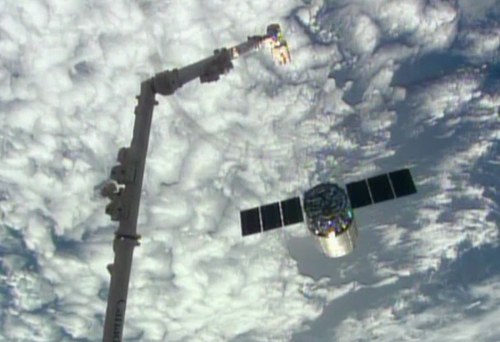
An Orbital Sciences Corporation Cygnus spacecraft departs the ISS on February 18, ending the first of eight such cargo transportation missions for the company. It and SpaceX are likely to compete for a new round of contracts that NASA is beginning the planning for.
NASA’s current contracts with Orbital Sciences Corporation and SpaceX for transporting cargo to and from the International Space Station, called Commercial Resupply Services (CRS), cover missions that run through 2016. With the station scheduled to remain in operations to 2020, and now to perhaps at least after the Obama Administration’s announcement of a proposed extension last month, NASA and those cargo providers have to start thinking ahead to a new round of CRS contracts.
On Friday, NASA issued a request for information (RFI) for a “follow on capability” for CRS, or CRS2. The RFI is designed to collect information form industry that would “help NASA refine and mature the follow on acquisition plan” for CRS2. The document doesn’t indicate when NASA would issue a formal RFP for commercial cargo services, but responses to the RFI are due on March 21.
According to the document, CRS2 would cover the period of 2017 through 2024, with funding of $1.0–1.4 billion per year for cargo transportation services. NASA anticipates needing the transportation of 14,250–16,750 kilograms per year of pressurized cargo and 1,500–4,000 kilogram of unpressurized cargo, and the return or disposal of a similar amount of cargo. NASA anticipates four to five missions a year to transport that cargo to and from the station.
Orbital and SpaceX are the two companies that have CRS contracts, with SpaceX preparing to launch its third CRS mission, of twelve, next month and Orbital just completing the first of eight CRS missions earlier this week. At a commercial spaceflight panel Friday night that is part of the SpaceUp Houston “unconference” this weekend, representatives of both companies said they were relatively satisfied with how the current CRS contracts are structured.
“I think the FAR Part 12 commercial contracting we have in place for the CRS program is working very well,” said SpaceX’s Garrett Reisman. That’s a reference to a section of the Federal Acquisition Regulations that cover the acquisition of commercial items. That approach, he said, is much more streamlined than other government contracting mechanisms, and closer to a commercial contract. He added that he hopes that the commercial crew transportation services will follow a similar approach for acquiring crew transportation services once a vehicle or vehicles enter service.
Jeff Siders of Orbital agreed. “The contracting mechanism has worked fine, and we’d see that continuing with no problems,” he said.

Leave a Reply